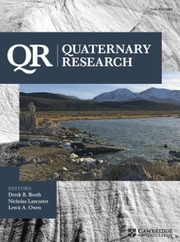Article contents
Recent hydrological variability of the Moroccan Middle Atlas Mountains inferred from microscale sedimentological and geochemical analyses of lake sediments
Published online by Cambridge University Press: 07 December 2018
Abstract
Study of the hydro-sedimentary dynamics of lakes provides key information on hydrological changes. In this work, we investigate Lake Azigza in the Moroccan Middle Atlas, a region that suffers from a scarcity of observational hydrological data necessary for a coherent management of water resources. Sedimentary deposits of Lake Azigza (32°58′N, 5°26′W, 1,550 m above sea level) were dated and analyzed by combining geochemical and mineralogical measurements coupled with microfacies characterization for the last 134 yr. The detrital component derived from X-ray fluorescence elemental composition and microstructures analysis of the lake sediments provided proxies of runoff activity and lake-level changes, respectively. These proxies were calibrated with regional hydro-climatic and instrumental measurements available over the last 50 yr and used to reconstruct past hydrological changes on inter-annual to decadal time scales between 1879 and 2013. Since 1879, lake level and runoff proxies responded in phase to regional inter-annual precipitation variations. We also show that after the major lake-level drop observed in 2008, the response of the runoff proxy to variable precipitation regime is enhanced. Such an approach emphasizes the potential of these hydro-climate-sensitive sedimentary archives to assess the impact of climate change in the Mediterranean region.
- Type
- Research Article
- Information
- Copyright
- Copyright © University of Washington. Published by Cambridge University Press, 2018.
References
REFERENCES
- 5
- Cited by


